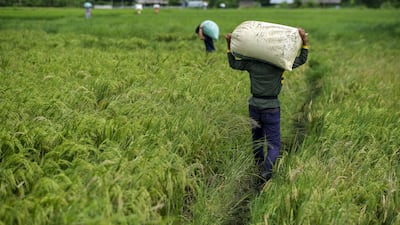The Philippines is expecting World Trade Organisation ministers to forge agreements on the key fishing and agriculture industries that will address sustainability and food security, a government official has said.
Any deal on the sectors, both of which are key to the country's economy and workforce, would provide a boost to one of South-East Asia's growing economies, Philippine Trade and Industry Secretary Alfredo Pascual told the UAE's state news agency Wam.
With Comoros and Timor Leste expected to be formally accepted as WTO members at the trade body's Ministerial Conference in Abu Dhabi this week, this would signify "the culmination of the second phase of negotiations on fisheries subsidies", he said.
Mr Pascual is also expecting agreements for agriculture, “focusing on enhancing food security, a concern that is paramount for many nations”.
The WTO struck a fisheries agreement in 2022 that banned subsidies contributing to illegal, undeclared and unregulated fishing. The organisation now hopes to conclude a second deal, which will focus on subsidies that drive overcapacity and overfishing.
On agriculture, the WTO's negotiations will cover topics including domestic support, market access, export competition, export restrictions, cotton, public stockholding for food security purposes, the special safeguard mechanism and the cross-cutting issue of transparency.
"These discussions are crucial for ensuring a balanced and progressive global trading system," Mr Pascual said.
The Philippines, an archipelago of more than 7,600 islands, counts fishing and agriculture as key components of its economy, thanks to an abundance of water and land, providing millions of jobs, particularly in rural areas.
The fisheries sector contributes about 1.3 per cent to the country’s GDP and provides around 1.6 million jobs, or about 4 per cent of the labour force, according to the World Bank.
13th WTO Ministerial Conference in Abu Dhabi – in pictures
The Philippines is also the 11th-largest seafood producer globally, with annual production of more than 4 million tonnes, data from the US-based non-profit Sustainable Fisheries Partnership shows.
The agriculture industry, on the other hand, grew 1.2 per cent in 2023, doubling the 0.6 per cent it posted in 2022, the Philippine Statistics Authority reported earlier this month.
The sector comprised about a quarter of the country's workforce and contributed around 9 per cent of GDP last year, the PSA said.
The Philippine economy also recorded a strong rebound from the Covid-19 pandemic. From a contraction of 9.5 per cent in 2020, the economy rebounded to a 5.7 per cent growth in 2021, which surged further to 7.6 per cent in 2022.
Manila, however, missed its economic growth target in 2023, having only expanded 5.6 per cent, compared to a projection of between 6 per cent to 7 per cent.
“I am optimistic that this conference will mark a significant step forward in these essential areas, reflecting our collective commitment to a more equitable and sustainable global trade environment," Mr Pascual said.








